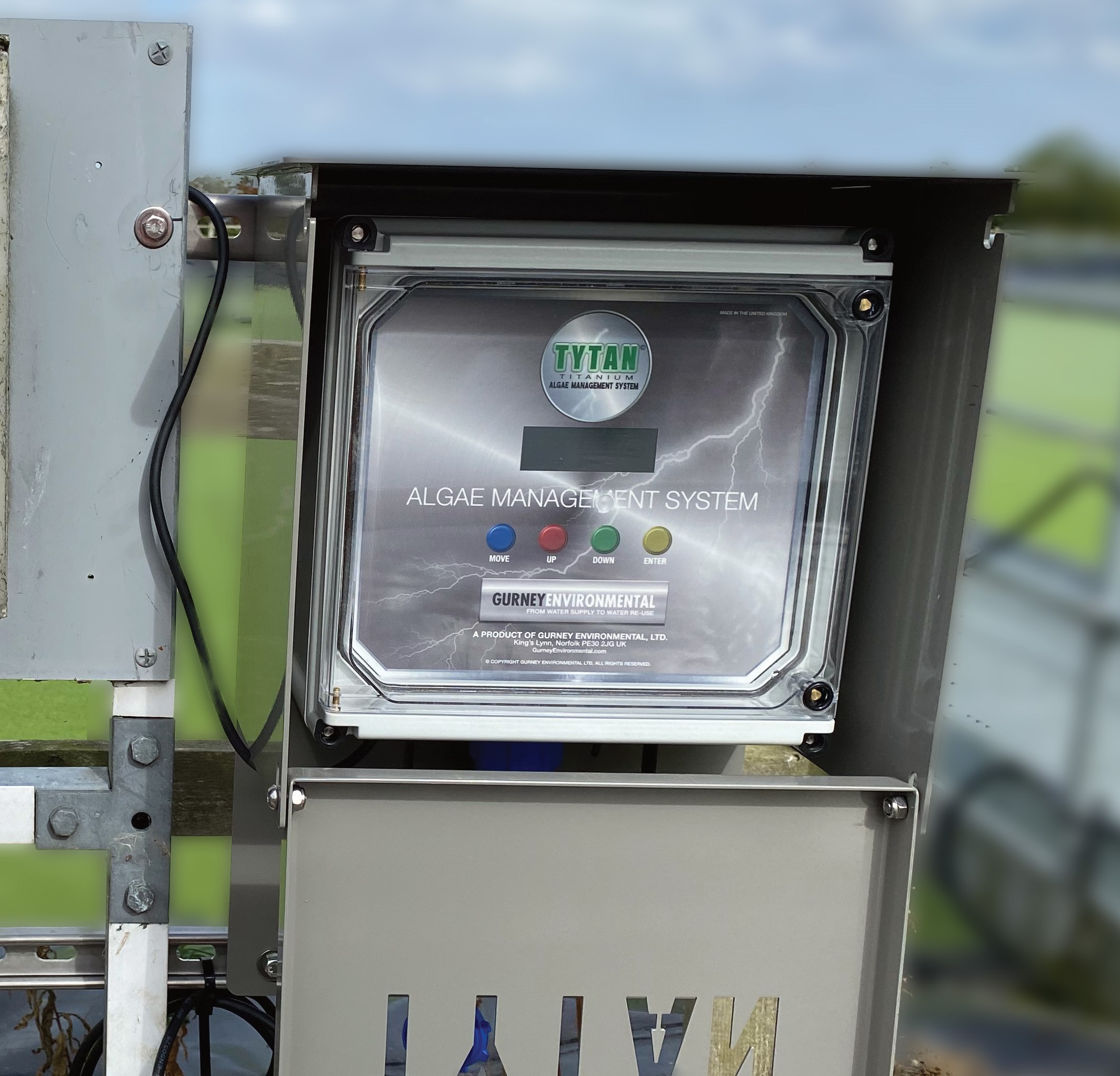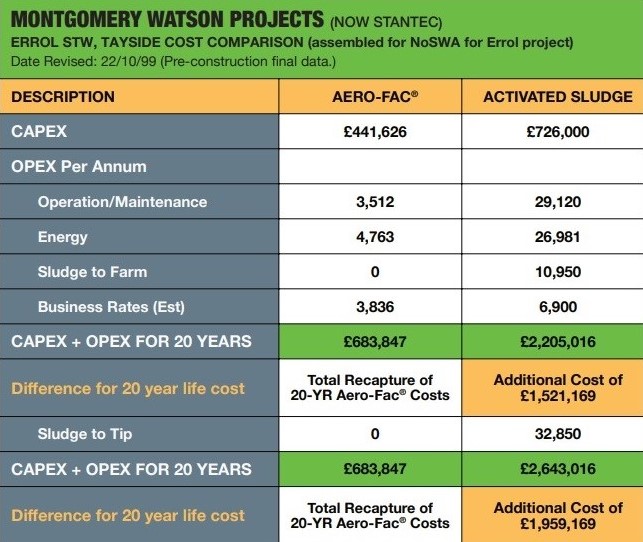After 22 successful years of operation, Scottish Water’s Nature-Based Errol Aero-Fac® WwTP has been inexpensively refurbished and expanded allowing for another 20 years of low cost operations.
In 2001, Montgomery-Watson Projects (now Stantec) and then North of Scotland Water (NoSWA) christened the very first Aero-Fac® WwTP in the UK, a unique “greener” approach to wastewater treatment. The idea was to provide consistent effluent quality for the sensitive Tayside estuary area, eliminate bothersome sludge lorry movements in and out of the WwTP including the major road access costs and issues, accommodate both long-term growth and peak load/flow swings spanning 20+ years, whilst at the same time requiring minimal manpower on site, ongoing maintenance and additional capital replacements — and incorporating amazingly little energy usage. Plus it was important to also install a treatment works that would not create any odour issues for the area. In fact, over the years visitors to the Errol plant have been quite amazed by the lack of odour. Many remark that it is hard to believe that they are at a sewage treatment plant.
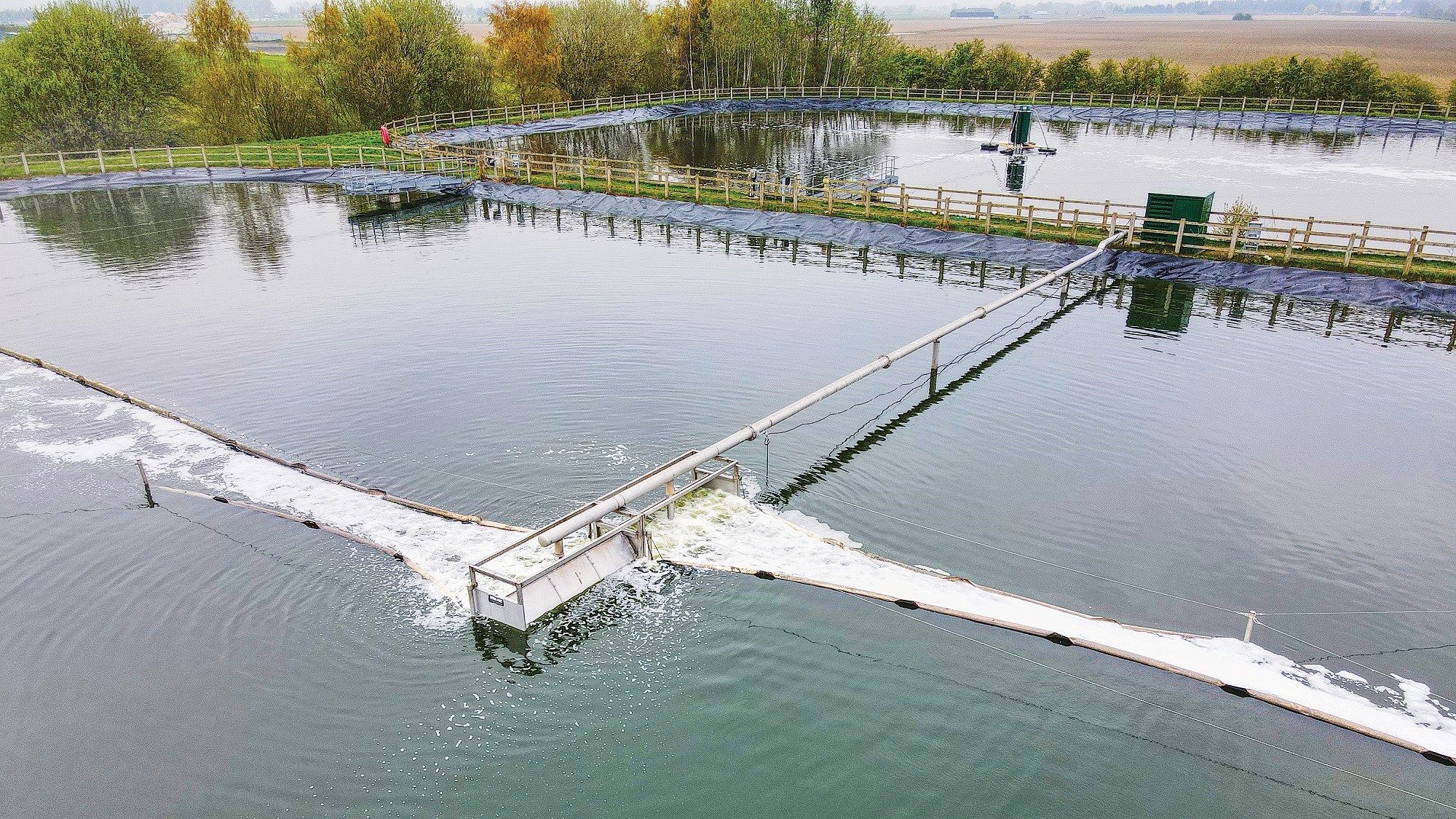
Long term proven performance
2021 marked 20 years of successful operation for the Errol facility. In 2023, Scottish Water engaged the supplier of the Aero-Fac® system, Gurney Environmental, to perform a relatively inexpensive 20-year refurbishment and expansion of the treatment works to accommodate a 50% increase in load and anticipated growth for the next 20 years.
In reporting on the 20-year track record of service and performance of the Errol Aero-Fac® WwTP, Scottish Water’s Robert Dey said: ”[Aero-Fac®] offered high process performance, but with low OPEX costs compared to a traditional plant, both in terms of operator attendance, maintenance and power usage, and in the fact the plant only needed sludge removal at intervals of several decades.
“In the 20 years since the plant was brought into service, it has indeed had both low maintenance costs, and low operator input. At the last testing it has been found to have very low sludge build up and at this anniversary, there has had to be no consideration of emptying to remove sludge build-up. We have never had any odour complaints at Errol.
“In tandem, it has given consistent performance with a 100% record in terms of compliance with consent conditions. Another important element of the Aero-Fac® system was low energy costs and with the wind-driven SERIES 3 aerators augmenting the mains-powered blowers, it has reduced the potential energy costs. Although it was not such a high consideration 20 years ago,
Errol also supports Scottish Water’s moves to becoming carbon neutral.”
Dey went on to say: “The Aero-Fac® system also uses much less concrete than traditional forms of construction. The aforementioned reduction in OPEX costs and the renewable energy element means that in both CAPEX and OPEX terms, the Aero-Fac® system accords with Scottish Water’s carbon-neutral vision.”
Selecting a truly sustainable solution
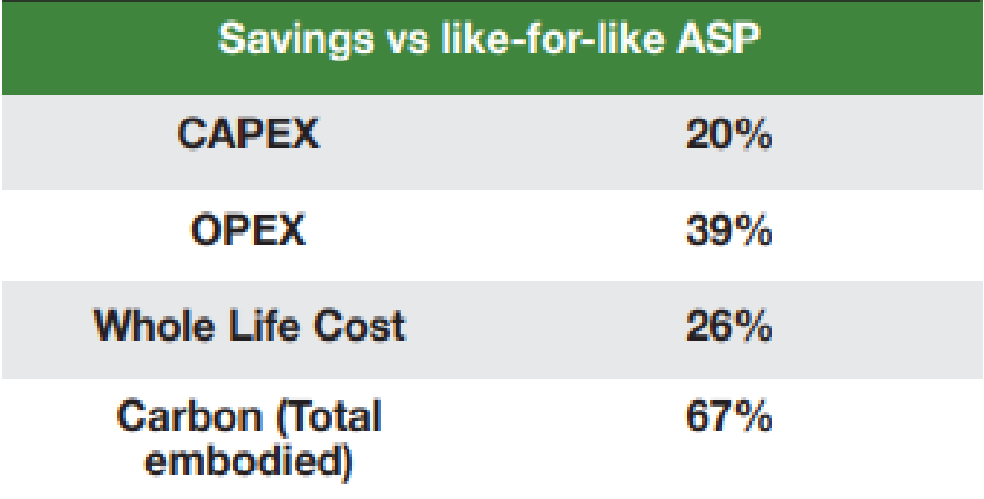
North of Scotland Water (NoSWA), the Scottish water authority at the time of construction, implemented a fast, innovative and economic solution for treating the wastewater from the community of Errol on the scenic Tay estuary near Dundee. The innovative Aero-Fac® approach provided cost and environmental benefits that soon came to have implications for wide application across the rest of Scotland and the UK. An analysis of various options at the time demonstrated a remarkable cost advantage for the Aero-Fac® option in both immediate CAPEX as well as 20-year-life CAPEX and OPEX — and a lower carbon footprint.
Following construction and commissioning of the new WwTP, the effluent from Errol routinely met discharge requirements. Most importantly, it did so without the production of sludge requiring costly handling and highly-regulated disposal.
By adopting a highly sustainable system with a completely Nature Based biological process, very little in the way of mechanical equipment, operational manpower or energy has been needed for routine operation of the plant over the 20 years, thereby meeting the needs of Scottish Water in providing affordable public services. The time-tested technology provided reliable process control to achieve quality of effluent with low capital and exceptional flow flexibility, and over the last 22 years the performance has only reinforced those benefits.
John Gillett, MD of Gurney Environmental said: “Errol is a good example of just how good a neighbour an Aero-Fac® plant can be! No odour. No sludge lorries. No noisy mechanical equipment. The Errol WwTP routinely processes the community’s wastewater with little operator attention and is an attractive facility that fits within its sensitive natural environment.”
Meeting the Challenges of Climate Change Including Serious Stormwater Overflows
John goes on to say: “Aero-Fac® has also been shown to be uniquely suited to meet the many challenges of climate change, including meeting new legal requirements for stormwater overflow containment (CSOs). Unlike traditional treatment works options, the significantly greener Aero-Fac® option offers an extremely low carbon footprint with dramatic energy savings through the use of renewable energy, no costly sludge removal or handling, plus lower cost, nature-based, energy-free disinfection, thereby making effluent suitable for irrigation water re-use or safe-bathing waters whether discharged to river or sea.
“As an example, Northumbrian Water’s 2018 Waren Mill Aero-Fac® WwTP has been operating odour-free and sludge-free with over 10x flow/load variation, and automatically handles storm surges/CSOs without operator intervention or problematic discharges. Yorkshire Water’s new Award Winning 15,000 PE Withernsea Aero-Fac® WwTP likewise has been designed to automatically accommodate a 2x flow/load variation plus CSO/storm surges without operator intervention.”

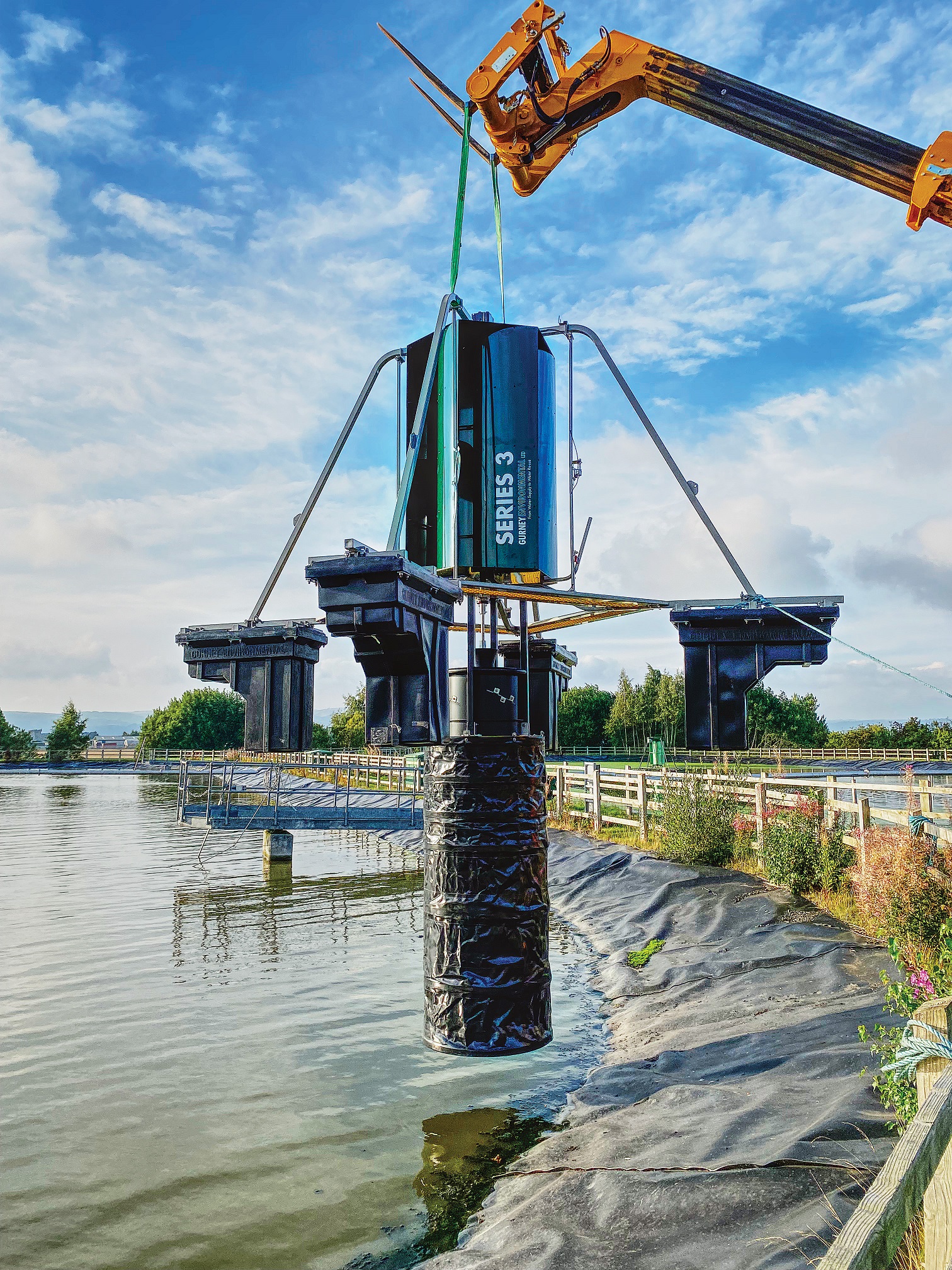
Lower-cost, More Sustainable, Natural/ Greener Disinfection Utilised
As an example of a “Greener”, nature-based, lower maintenance and cost approach, the UV system typically required by the Environment Agency was engineered out of both the Errol and the Withernsea WwTPs. Monitoring carried out by Stantec at other Aero-Fac® wastewater treatment plants around the UK demonstrated that the WwTP had met the discharge requirements via a greener, nature-based method without the need for expensive, higher carbon footprint traditional UV.
The unique combination of inherent disinfection provided by the natural biochemical process, enhanced by sun exposure provided by the continual gentle mixing provided by Gurney Environmental’s renewable energy wind powered SERIES 3 aerator/mixers ensure that cell contents are repeatedly exposed to the sun for effective natural UV kill.
This inherent benefit — combined with longer retention/stabilisation times — produces an effluent that is safe for irrigation water reuse, which according to the EU and various articles and papers on climate change, is going to be needed in the future. This also has the advantage where wastewater treatment systems can operate with better disinfection capabilities and require smaller or even no costly tertiary disinfection.
The Search for Sustainability
When initial costs, ongoing 20-year costs, plus Carbon Footprint considerations are all examined in order to make the best decisions for wastewater treatment, what are considered “greener”, Nature Based Systems can offer well documented and well proven significant long-term cost and performance advantages.
